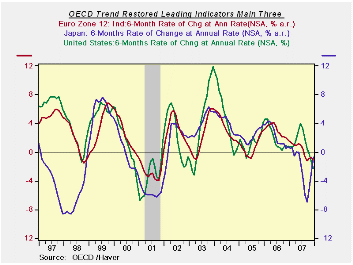 Global| Feb 08 2008
Global| Feb 08 2008OECD Leading Indices Drop: Except Japan
Summary
The OECD indices sure do look like ‘slowdown’ but with the exception of Japan, the indicated weakness is not yet that severe. In the case of Japan, while the OECD reading had been severe, its low point has passed as Japan’s signal now [...]

The OECD indices sure do look like ‘slowdown’ but with the
exception of Japan, the indicated weakness is not yet that severe. In
the case of Japan, while the OECD reading had been severe, its low
point has passed as Japan’s signal now points to recovery, diminishing
the sour signal. Over the preferred horizon to view these indicators,
six months, it is the US that is weakest in this grouping.
With the G-7 meeting this weekend there is not much cheer from
theses indicators. While the OECD measures have Japan on the mend,
Japan’s own domestic yardsticks are still producing increasingly weak
readings for some of its preferred cyclical measures.
| OECD Leading Indicators by Main regions/countries | ||||||
|---|---|---|---|---|---|---|
| Dec-07 | Nov-07 | Oct-07 | 3-Mo | 6-Mo | 12-Mo | |
| OECD | -0.2% | -0.1% | 0.1% | -0.7% | -2.8% | -0.2% |
| OECD 7 | -0.3% | -0.1% | 0.0% | -1.7% | -4.0% | -1.8% |
| OECD Europe | -0.2% | 0.1% | 0.1% | -0.1% | -2.1% | -1.3% |
| OECD Japan | 1.1% | 1.0% | 0.5% | 11.0% | -1.9% | -3.9% |
| OECD US | -0.6% | -0.5% | -0.2% | -5.0% | -5.0% | -0.8% |
Robert Brusca
AuthorMore in Author Profile »Robert A. Brusca is Chief Economist of Fact and Opinion Economics, a consulting firm he founded in Manhattan. He has been an economist on Wall Street for over 25 years. He has visited central banking and large institutional clients in over 30 countries in his career as an economist. Mr. Brusca was a Divisional Research Chief at the Federal Reserve Bank of NY (Chief of the International Financial markets Division), a Fed Watcher at Irving Trust and Chief Economist at Nikko Securities International. He is widely quoted and appears in various media. Mr. Brusca holds an MA and Ph.D. in economics from Michigan State University and a BA in Economics from the University of Michigan. His research pursues his strong interests in non aligned policy economics as well as international economics. FAO Economics’ research targets investors to assist them in making better investment decisions in stocks, bonds and in a variety of international assets. The company does not manage money and has no conflicts in giving economic advice.
More Economy in Brief
 Global| Feb 05 2026
Global| Feb 05 2026Charts of the Week: Balanced Policy, Resilient Data and AI Narratives
by:Andrew Cates






